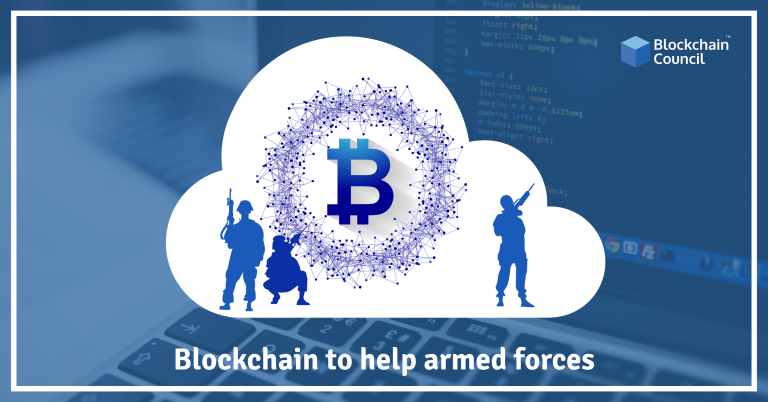
- Toshendra Kumar Sharma
- July 08, 2018
Armed force is an essential pillar of any nation. From ensuring the security at the border to fighting the crisis, the armed forces play a crucial role. Military people communicate in codes, and secret language and all these information are highly confidential. It might contain valuable information about the nation, or it might have some secret codes. With the increasing issues regarding cybersecurity, it becomes imperative to protect this information at all cost. So, how can we ensure this? It’s true that the military agencies make use of the state of the art technologies to provide security of information, but still, this system is not full-proof. Thus, there is a need for a system which can guarantee complete safety.
Is blockchain the solution?
Blockchain has seen acclivitous growth in recent years, since its inception in 2008 till the present time, and the technology has found many applications apart from cryptocurrency exchange. Today, many industries are using this technology in fields like healthcare, supply chain, shipping, etc. Owing to its multifaceted features, we can use this technology for a lot for many other purposes. In this blog, I will be highlighting how blockchain is playing a vital role in the defence sector.
However, there are certain challenges which even the defence companies have to face. Although, there has been growth in the same and the defence companies are spending a considerable sum of money. This investment has given us the result, but with the growth the defence segment is witnessing, it is important that there must be more investment so that the defence sector functions more effectively. The defence companies are investing heavily in this segment and blockchain is an emerging technology which proposes to be an excellent technology for managing supply chain and tracking of products. Both these features of blockchain can prove beneficial for the armed forces as well.
When it comes to the blockchain, it offers accurate, auditable, secured and decentralised record keeping and thus, can prove to be beneficial for the armed forces. Using this technology and syncing it with their supply chain, the armed forces can keep a track on their ammunition supply chain, the places where it is talking a halt and the series of the levels it passé through.
Analysing the use of blockchain for armed forces-
As already mentioned, blockchain can prove to be beneficial for the armed forces in myriads of ways. Using blockchain technology can solve a lot of their purpose and here is how armed forces can use this technology:
Tracking Supply Chain– Well, this is the most prominent use of blockchain technology. Management of the supply chain in the defence sector is a challenging task, it is a complicated process and has many challenges. With the help of its traceability and tracking features the supply chain system becomes highly robust and reliable.
The immutability characteristic of blockchain technology ensures that the data remain unalterable without the consent of all the parties. Thus, it works in favour of armed forces. Furthermore, it also culminates the probability of frauds and errors in defence contracts and enhances the accuracy of inventory management, eventually building trust between suppliers and the customers.
Decentralizing weapon control systems- Decentralization is the critical feature of the blockchain, it will have an advantage for powering systems like Aegis. With the help of this technology, we can verify that all the nodes are working together in a coordinated way. Lockheed Martin, one the key suppliers in defence sector in the US has incorporated blockchain technology into their supply chain risk management, system engineering process, software development, etc. It has become the first company to use blockchain.
Manufacturing Process- we know that the information once recorded in blockchain is visible to everyone in the network and this data is immutable. Once the information gets recorded in the distributed ledger, it becomes unalterable and unchangeable. This feature can prove to be beneficial for the defence segment. It enables the users to see the exact details of any particular components. The components can be recorded at different stages of production and installation, and thus blockchain can prove to be beneficial in the manufacturing process of the arms.
Safety from cyber attacks– The current system is a centralised one. Every information is stored in a central repository. Thus, it becomes more vulnerable to cyber attacks. In fact, if there is a failure at a central system, then the entire system fails. So, we need a full-proof system which can guarantee the security of information. The blockchain is a centralised system wherein all the information is distributed across the nodes. Whenever you want you can access this information and no third party can barge into the system to hack it, steal it or change it. And hence, you have a full-proof system which is free from information leakage.
Take Aways-
It is evident that the armed forces are present globally and have to manage a global supply chain. We know that there is a need for a system which can ensure complete security and transparency of this supply chain. Every year the military spends millions and millions to use the best technologies that can guarantee the seamless supply chain management, data management, data security, etc. But somewhere this system also doesn’t ensure complete safety and security. Blockchain with its features like immutability and decentralisation can give an extra edge to the current security system.





































































 Guides
Guides News
News Blockchain
Blockchain Cryptocurrency
& Digital Assets
Cryptocurrency
& Digital Assets Web3
Web3 Metaverse & NFTs
Metaverse & NFTs
